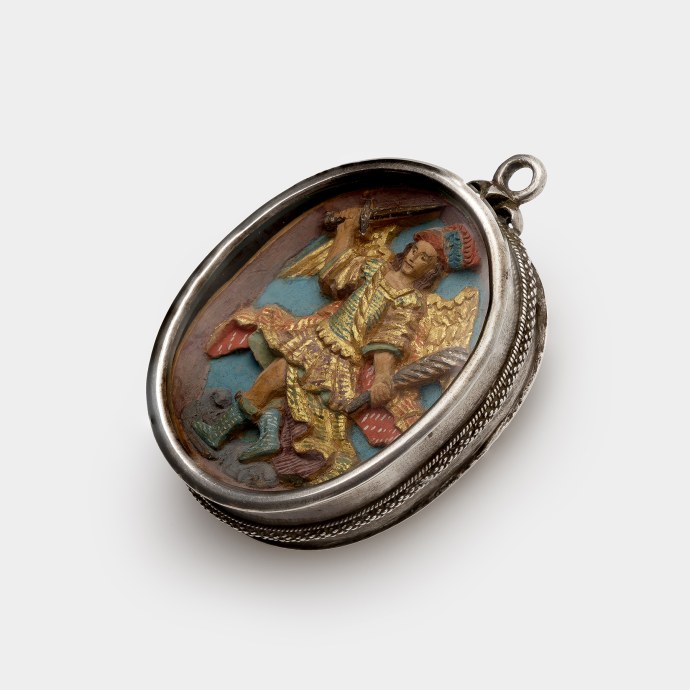


‘Relicario’ with scenes of the Holy Family and Archangel Saint Michael
, Latin or South America, 18th century
‘Relicario’ with scenes of the Holy Family and Archangel Saint Michael
Description
Oval-shaped, double-sided silver locket pendant made of a wide collet frame with ornamental bands of twisted and double-twisted wires. Beveled crystals cover the wooden carvings in high relief with polychrome colors and gilding against a turquoise blue background. On the obverse is the scene of the Holy Family gathered around the Christ Child standing on a head, being held by the Virgin Mary and Saint Joseph, while behind stand St. Anne and John the Baptist; and on the reverse is the Archangel Saint Michael in golden armor slaying a dragon at his feet, holding a sword and palm frond. The two-part locket is detachable to insert the wood plaque carved on both sides. The pendant is in good wearable condition.
Literature:
In Spain and Spanish Latin and South America such lockets worn as symbols of piety are often described as ‘relicario’, traditionally a container for relics; however, the term is colloquial and loosely applied to lockets containing sacred images, like here.
In Europe the representation of the Holy Family became popular in the Middle Ages and increasingly during the Renaissance to include Mary and Joseph with the Christ Child, and later the Virgin’s mother St. Anne and St. John the Baptist. In Christian art the image of Saint Michael the Archangel has even earlier roots. Here he is depicted as a military saint in armor, the leader of the heavenly armies fighting the dragon, symbolically defeating Satan, to defend the Christian faith.
Whilst the scene follows the iconography of Spanish Christian art, the wood carving has stylistically been adapted to the native styles of the indigenous artisans of the South American continent. This is particularly apparent in the one-dimensional and frontal depiction of the figures of the Holy Family; they could even be representations of local Andrean people. The choice of bright and rich colors and the gold overlay paint suggests the pendant was made in the Viceroyalty of Peru. The silver locket itself may have been made by European craftsmen working in the Americas, foremost from Spain or Northern Europe under Spanish rule. For devotional pendants and reliquaries from the Americas, see: Martha J. Egan, Relicarios. Devotional Miniatures from the Americas, Santa Fe, New Mexico 1993, pp. 73-101, and fig. on page 97.